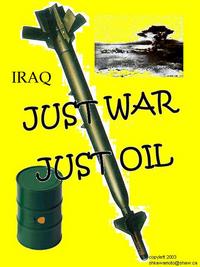 Rohan Pearce
Rohan Pearce Rohan Pearce
Rohan Pearce It's been a frequent refrain of US officials that Washington is winning its counter-insurgency war in Iraq. It's very important for the people of the world really to know that we are winning, we are making progress in Iraq. We are defeating terrorists. In this case, however, it was US-installed Iraqi Prime Minister Iyad Allawi who made the claim. Allawi made these remarks at a September 21 press conference with US President George Bush in New York. He repeated the claim in an address delivered two days later to a joint sittings of both houses of the US Congress.
Of course the similarity between Allawi's claims and White House propaganda is hardly coincidental, as Allawi's Interim Government of Iraq is a creation of the US occupation. Moreover, Allawi's speech was drafted by US officials. According to the September 30 Washington Post, US officials, speaking on the condition of anonymity, said the prime minister was coached and aided by the US government, its allies and friends of the administration. Among them was Dan Senor, former spokesman for the [Coalition Provisional Authority] who has more recently represented the Bush campaign in media appearances. Senor, who has denied writing the speech, sent Allawi recommended phrases. He also helped Allawi rehearse in New York last week, officials said. Senor declined to comment.
The US Embassy in Baghdad and British Foreign Service officials also helped Allawi with the text and delivery of his remarks, said administration officials who were involved.
But whether the claim that the anti-occupation insurgency in Iraq is weakening is being pumped out by US officials or their Iraqi puppets, it doesn't make it more accurate.
In a rare departure from the official White House line, during a television interview broadcast on September 26 US Secretary of State Colin Powell admitted that the anti-occupation insurgency was gaining in strength.
This was confirmed by a report prepared by Special Operations Consulting-Security Management Group (SOC-SMG), a US security firm operating in Iraq, which revealed that in the 30 days leading up to September 28 there were more than 2300 attacks by Iraqi resistance fighters on the occupation forces.
If you look at incident data and you put incident data on the map, it's not a few provinces, Adam Collins, the firm's chief intelligence analyst in Iraq, told the September 28 New York Times.
The NYT reported that the data compiled in the SOC-SMG report shows that the attacks are spread over nearly every major population center outside the Kurdish north. Collins told the NYT that there are an average of 80 attacks a day by resistance forces.
The NYT noted that no raw compilation of statistics on numbers of attacks can measure the extent of the occupation forces' control over the Iraqi population. For example, the number of attacks is not an accurate measure of control in Fallujah; attacks have recently dropped there, but the town is controlled by insurgents and is a `no go' zone for the American military and Iraqi security forces.
While the number of attacks by resistance forces has been increasing, so too have Iraqi civilian casualties. However, according to an Iraqi health ministry survey obtained by the US Knight Ridder Newspapers chain, two-thirds of Iraqi civilian casualties are the result of operations by the US occupation forces and their puppet Iraqi security forces.
KRN reported on September 25 that the health ministry had recorded 3487 Iraqi deaths in 15 of the country's 18 provinces from April 5 when the ministry began compiling the data until September 19. Of those, 328 were women and children. Another 13,720 Iraqis were injured.
Iraqi officials said the statistics proved that US air strikes [on Fallujah and other Iraqi cities] intended for insurgents also were killing large numbers of innocent civilians, KRN reported.
The Americans keep criticising Saddam [Hussein] for the mass graves. How many graves are the Americans making in Iraq? KRN quoted former Iraqi army general Abu Mohammed as saying. The Americans keep attacking the cities not to keep the security situation stable, but so they can stay in Iraq and control the oil, said 24-year-old Baghdad fruit vendor Raid Ibraham.
Pentagon officials' public estimation of the numerical strength of the Iraqi resistance has gone from 3000-5000 at the start of the year to 20,000 in September. However, neither the estimates of the number of resistance fighters nor the spread and frequency of attacks tell the full story of Iraqis' challenge to the occupation.
The estimate of the number of resistance fighters doesn't count the number of Iraqis who, while not taking up arms, actively assist the resistance or are sympathetic to its aims.
The September 29 Washington Post reported: While President Bush, Defense Secretary Donald H. Rumsfeld and others have delivered optimistic public appraisals, officials who fight the Iraqi insurgency and study it at the CIA and the State Department and within the Army officer corps believe the rebellion is deeper and more widespread than is being publicly acknowledged, officials say.
People at the CIA `are mad at the policy in Iraq because it's a disaster, and they're digging the hole deeper and deeper and deeper', said one former intelligence officer who maintains contact with CIA officials.
Things are definitely not improving, an anonymous government official told the Post.
It is getting worse, the Post was told by a US Army officer who had served in Iraq and maintains contact with his colleagues in Baghdad via email. The officer cited the fact that the Iraqi resistance has infiltrators conducting attacks in the Green Zone. That was not the case a year ago.
From Green Left Weekly, October 6, 2004. http://www.greenleft.org.au/back/2004/601/601p15.htm & http://www.aglob.ru